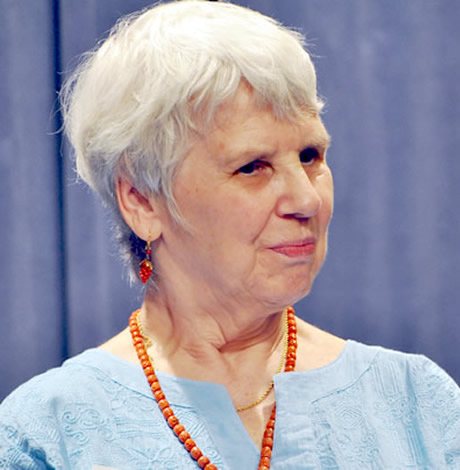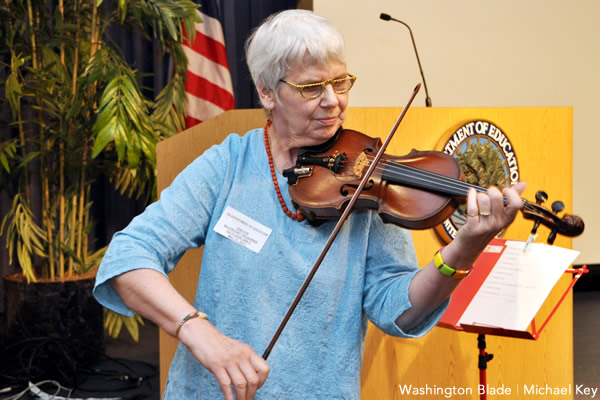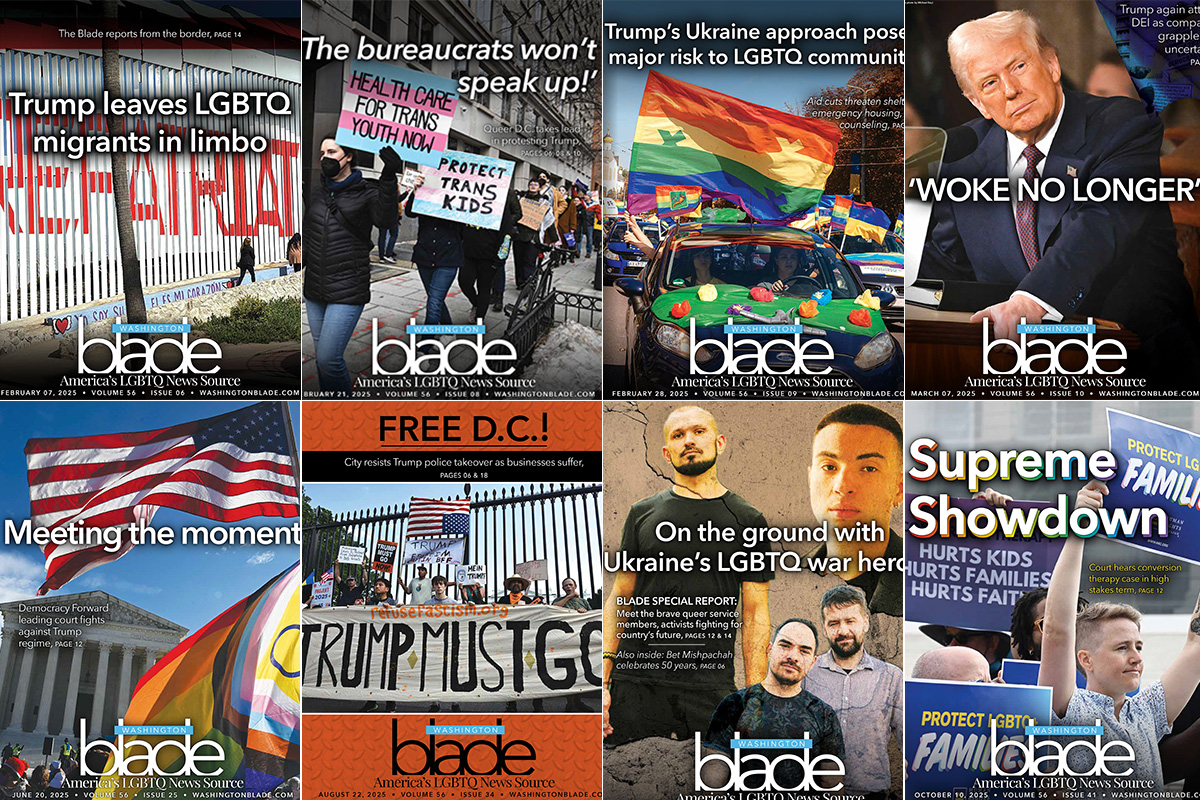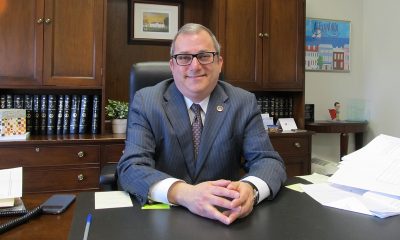Opinions
Fight erasure—take the Virginia statehouse
Lilli Vincenz’s 2005-’06 battle in Arlington has a lesson for today


The determination by some people to impose their personal faith dictates in commercial transactions is sadly nothing new.
Consider the use of “religious freedom” to legitimize anti-LGBT discrimination. In 2005 in Arlington, Virginia, when lesbian activist Lilli Vincenz tried to order VHS copies of films she made in 1968 and 1970, she hit the same wall under the term “core values.”
Tim Bono of Bono Film and Video refused to do the video transfer because, he said, it would violate his core values. The films, I should not have to mention, were not pornography. They were the 7-minute “Second-Largest Minority,” covering the gay Reminder Day Picket in front of Independence Hall in Philadelphia on July 4, 1968; and the 11.5-minute “Gay and Proud,” covering the first Christopher Street Liberation Day Parade in New York City on June 28, 1970.
Vincenz filed a complaint in May 2005 against Bono Film for violating Chapter 31 of the Arlington County Code prohibiting discrimination on the basis of sexual orientation. The Arlington Human Rights Commission held a public hearing in March 2006. Vincenz spoke eloquently of her films and her activism and of being wronged by Bono. Bono claimed the Commission could not force him to provide service in violation of his religious beliefs.
The Commission ruled against Bono in April 2006, requiring him to do the work or pay for it to be done elsewhere. Commission chair Tim Brogan said, “If you are a business providing services to the public, you can’t choose who you provide services to and who you are not going to provide services to…. That is illegal in Arlington.”
Mat Staver and Liberty Counsel filed suit against the Commission in May on behalf of Bono in Arlington Circuit Court, citing the Dillon Rule that limits the power of localities to what is specifically granted by state legislatures. There being no sexual orientation protections in Virginia’s Human Rights Act, Staver claimed the Arlington statute had overstepped the county’s authority.
The Commission reconsidered Lilli’s case in June 2006 and dismissed it by reframing the issue: it said Arlington may prohibit discrimination against individuals but may not “prohibit discrimination based on content of materials”—essentially reducing the county ordinance to a toothless expression of sentiment. Virginia voters compounded the injustice in November 2006 by passing the Marshall-Newman Amendment to the state constitution denying any legal status to same-sex couples or LGBT individuals.
The U.S. Supreme Court nullified anti-marriage-equality state constitutional provisions with Obergefell in 2015, but this did not make people like Staver go away. He is the same Mat Staver who defended Kim Davis in Kentucky for denying marriage licenses to same-sex couples; who became dean of Liberty University Law School; and who opposes congressional anti-lynching legislation because it includes sexual orientation.
With the U.S. Constitution mentioning states but not localities, progressive municipalities are in a weak position when going beyond state law. Passage of LGBT nondiscrimination bills in Virginia, such as John Bell’s HB 2067 (on public employment), Roxann Robinson’s HB 2677 (on fair housing), and Mark Levine’s HB 2421 (an “LGBTQ omnibus” bill), requires Democrats to win control of the House of Delegates. Two Senate bills passed with bipartisan support.
I relied for the Bono case history on McDermott Will & Emery, legal counsel to the Mattachine Society of Washington, D.C., of which I am secretary. Mattachine President Charles Francis says, “Thanks to McDermott’s research and analysis, we were able to uncover how Lilli Vincenz—a true pioneer of the LGBT rights movement—could be so discriminated against in our time, even in Arlington, Virginia.”
In a forthcoming article on the Bono case, Mattachine’s McDermott team writes, “While Arlington County has a non-discrimination ordinance in place to this day, and one that provides protection of LGBTQ citizens as well as others, future Plaintiffs have a clear path to challenge its authority if they take issue with providing services to LGBTQ customers.”
Francis adds, “This forgotten history—from ‘Gay and Proud’ at the first Christopher Street Liberation Day Parade in New York to Lilli Vincenz’s pioneering courage over the decades in Arlington—must stand as an inspiration for action this election day in Virginia.”
That’s November 5.
Richard J. Rosendall is a writer and activist. He can be reached at [email protected].
Copyright © 2019 by Richard J. Rosendall. All rights reserved.
Opinions
Support the Blade as mainstream media bend the knee for Trump
From CBS to Washington Post, MAGA taking over messaging

We knew it would be bad. I’m referring, of course, to 2025 and the unthinkable return of Donald Trump to the White House.
We just didn’t know how bad. The takeover of D.C. police. ICE raids and agents shooting defenseless citizens in the face. The cruel attacks on trans Americans. A compliant and complicit right-wing Supreme Court and GOP rubberstamping all the criminality and madness.
Much of that was outlined in Project 2025 and was predictable. But what has proven surprising is the speed with which major companies, powerful billionaires, and media conglomerates have hopped on board the authoritarian train and kissed Trump’s ring. Tech giants like Apple and Meta and media companies like CBS and the Washington Post have folded like cheap tents, caving to MAGA pressure and enabling Trump’s evil agenda.
The guardrails collapsed in 2025. Congress has ceded its role as a formerly co-equal branch of government. Once trusted media outlets have betrayed their audiences’ trust and morphed into propaganda arms of the White House. As a lifelong journalist, this is perhaps the most shocking and disappointing development of the past year.
The Washington Post, which adopted the ominous tagline of “Democracy Dies in Darkness,” killed its endorsement of Kamala Harris in the final days of the 2024 campaign. Same thing at the Los Angeles Times. More recently, CBS’s vaunted “60 Minutes” spiked a story critical of Trump’s immigration policies under the direction of new editor-in-chief Bari Weiss, a Trump toady and the antithesis of a journalist.
Concurrently, media companies large and small are fighting to survive. Government grants have been rescinded and the Corporation for Public Broadcasting, responsible for funding NPR and PBS, announced plans to dissolve. The Pittsburgh Post-Gazette, a nearly century-old Pulitzer Prize-winning institution, announced this week it will close on May 3. The Washington Post has lost scores of talented journalists, including prominent LGBTQ voices like Jonathan Capehart. The Baltimore Sun was acquired by the same family that owns right-wing Sinclair Broadcasting, ending a nearly 190-year tradition of award-winning, independent journalism.
It is not a coincidence that Trump’s attacks on democracy, traditions, and norms are happening while the media industry collapses. News deserts are everywhere now. In 2024, 127 newspapers closed, leaving 55 million Americans with limited or no access to local news, according to a report by Medill.
There’s a reason the media are called the “Fourth Estate.” Journalism was considered so critical to the health of our democracy that the Founding Fathers spelled it out in the First Amendment. Democracy and our Constitution cannot survive without a free and robust press.
That’s why I felt compelled to write this appeal directly to our readers. For nearly 57 years, the Blade has told the stories of LGBTQ Washington, documenting all the triumphs and heartbreaks and writing the first draft of our own history. Today, we remain hard at work, including inside the White House. This week, we have a reporter on the ground in Colombia, covering the stories of queer Venezuelan migrants amid the crisis there; another reporter will be inside the Supreme Court for next week’s trans-related cases; on Sunday, we have a reporter on the red carpet at the Golden Globes ready to interview the stars of “Heated Rivalry.”
We do a lot with a little. As major companies pull back on their support of the LGBTQ community, including their advertising in the Blade, we turn to our readers. We have never charged a dime to read the Blade in print or online. Our work remains a free and trusted resource. As we navigate these challenges, we ask that you join us. If you have the resources, please consider making a donation or purchasing a membership. If not, please subscribe to our free email newsletter. To join, visit washingtonblade.com and click on “Fund LGBTQ Journalism” in the top right navigation.
Our community is known for its resilience. At the Blade, we’ve weathered the AIDS epidemic, financial crises, and a global pandemic. We are committed to our mission and will never bend to a wannabe dictator the way so many mainstream media outlets have done. The queer press is still here and with your help we will survive these unprecedented attacks on democracy and emerge stronger than before. Thank you for reading the Blade and for considering making a donation to support our work.
Kevin Naff is editor of the Washington Blade. Reach him at [email protected].
Opinions
Time has run out for the regime in Venezuela
American forces seized Nicolás Maduro, wife on Jan. 3

Time has run out for the regime in Venezuela.
I am fully aware that we are living through complex and critical days, not only for my country but also for the entire region. However, the capture of Nicolás Maduro has renewed hope and strengthened my conviction that we must remain firm in our cause, with the certainty that the valid reward will be to see Venezuela free from those who continue to cling illegitimately to power.
In light of this new reality, I adopt a clear, direct, and unequivocal position:
I demand the immediate release of all political prisoners.
I demand that all persons arbitrarily detained for political reasons be returned to their families immediately, without delay or conditions.
According to Foro Penal, as of Jan. 5, 2026, there are 806 political prisoners in Venezuela, including 105 women, 175 military personnel, and one adolescent, and a total of 18,623 arbitrary arrests documented since 2014. The same report documents 17 people who have died while in State custody and 875 civilians prosecuted before military courts, clearly evidencing the use of the judicial and security apparatus as instruments of political persecution. In parallel, the humanitarian system estimates that 7.9 million people in Venezuela require urgent assistance, further aggravating the impact of repression on daily life.
Behind these figures are shattered lives, separated families, and destroyed life projects. Students, activists, human rights defenders, political leaders, and members of the armed forces remain imprisoned without judicial guarantees, without due process, and without justice.
Since the capture of Nicolás Maduro, repression has not ceased. On the contrary, more than ten journalists have been arbitrarily detained, while others have been harassed, imprisoned, or mistreated for carrying out their duty to inform. Today, journalism in Venezuela has become a heroic and high-risk act.
This situation is further aggravated by a new attack on fundamental freedoms: an illegitimate decree of “external state of emergency”, whose purpose is to legalize state terrorism, expand the scope of repression, and deepen the criminalization of dissent and freedom of expression.
The destruction of freedoms cannot and must not be normalized, either by society or by the international community.
I do not forget the atrocities committed against people deprived of their liberty: systematic violations of due process, torture, cruel, inhuman, and degrading treatment, denial of medical care, and prolonged isolation.
These practices have been widely documented and denounced and are currently under investigation by international justice mechanisms.
In this regard, the United Nations Independent International Fact-Finding Mission on Venezuela has repeatedly expressed grave concern over the persistence of serious human rights violations, including the use of torture, enforced isolation, and the responsibility of State security forces in systematic abuses, as reflected in its statements and reports issued on Jan. 3, 2026, and throughout 2025.
From my unwavering commitment to human rights, I issue a firm and urgent call to Venezuelan citizens and to all people in the free and democratic world to stand together in defense of human dignity.
All political prisoners must be released now.
All torture and detention centers must be closed.
I am convinced that there can be no genuine democratic transition without the immediate release of political prisoners, the submission to justice of those responsible for arbitrary detentions, and the establishment of accountability mechanisms, guarantees of non-repetition, and full reparation for victims and their families. This is the only viable path toward a proper transition to democracy in Venezuela.
Today, more than ever, I stand in solidarity, inside and outside Venezuela, with the victims and their families.
This is a moment of definition, not of silence or hesitation.
I assume, together with millions of Venezuelans, that we are co-responsible for our collective reality and for the new Venezuela that we are called to rebuild.
Dignity, freedom, and justice cannot wait.
Freedom for Venezuela.
Juan Carlos Viloria Doria is president of the Global Alliance for Human Rights and vice president of Venezolanos en Barranquilla, an NGO based in Barranquilla, Colombia.
Opinions
Just say no to the felon in the White House
Democrats, media must do more to oppose Trump’s agenda

We have a clearly deranged, sick, felon as president, who can’t even remember if he had an MRI, or a CT. He says he takes enough aspirin to keep his blood running thin in his veins. He fakes health reports, and lies every time he opens his mouth. His brain appears foggier than Joe Biden’s ever was.
The felon arranged to get a fake Peace Prize from the soccer federation, while taking military actions around the world. He sanctioned American attacks on Nigeria, Iran, Syria, and now on the government, and people, of Venezuela. He has our military attacking boats, claiming they are carrying drugs, with no proof. He interferes in foreign elections, making the United States less safe. He obviously supports Putin in his war against Ukraine, and supports Netanyahu’s destruction of Gaza, and his starvation of the Palestinian people there. Because of all this it’s understandable why he calls his Secretary of Defense, his Secretary of War. That individual being unqualified with no competence, or decency — the perfect toady for the fascists surrounding Trump. He has a Secretary of State in Marco Rubio who clearly has no principles at all. Rubio previously said, “Donald Trump – a con artist – will never get control of this party…We cannot allow a con artist to get access to the nuclear codes of the United States of America.” He compared Trump to a “third-world strong man.” Now as Secretary of State he justifies all the illegal actions the felon takes.
I, and many others, question “Where is Congress in all this?” Do no Republicans in Congress have any cojones? Two Republican woman have criticized Trump — Marjorie Taylor Greene (R-Ga.) and Nancy Mace (R-S.C.). Both on the Epstein files, one on screwing the American people with regard to their health insurance. Both are now out of Congress, still MAGA, but found if you disagree with the felon, he sics his cult on you.
My other question is: When will any in the media really stand up to him? When do mainstream media call out every one of his lies, as he makes them? When do they show any guts, and repeat each day he is deranged? When do they have daily headlines, calling him out on things from his health reports, to lies about the economy? Where are the daily headlines calling out the Republican Congress for its lack of action? Why is there no representative clock on every TV network, ticking off the time Congress doesn’t take back their rightful place as an equal branch of government? When will they call out the Supreme Court, reminding people what Trump’s picks said during their confirmations, versus what they are doing now? When will they actually reclaim ‘The freedom of the press?’
Democrats must continue to speak out. I am aware they have little power in this Congress, but they must not remain silent. We have seen, when they do speak up, we win elections. They help the people to wake up, as they did in recent elections in New Jersey and Virginia. In races as distinct as the mayoralty of Miami, where a Democrat won for the first time in 30 years, and did so in a landslide; and Democrats won two special elections for State Senate in Mississippi. In Georgia, Democrats won two seats on the Georgia Public Service Commission, the first time in 20 years they won a statewide seat. And they won a State Senate seat in Iowa, and the redistricting vote in California.
To continue winning Democrats must remind people every day what the felon, and his fascist cohorts, are doing to destroy their lives. Latinos and Hispanics need a daily reminder, it is the felon who once said he supports them, whose government is now deporting them. Young people must be reminded every day, the felon is destroying the country they will inherit, their future, by denying climate change. Everyone needs daily reminders how he is destroying the health of the country. Ending research grants looking for cures for cancer, Alzheimer’s, Parkinson’s, and HIV/AIDS. Ending research grants into curing childhood diseases, development of mRNA vaccines, and other potential progress to protect Americans, and the world, when the next pandemic occurs, and it will. He is literally killing children by having his government speak out against vaccinations for illnesses like measles, considered eradicated before he came into office.
All of this needs to be headlined each day in our newspapers, and on TV, by the people who still can, and are willing, to do it. Those not bought off by, or afraid of, the felon, and his fascist cohorts. Those who don’t sit with him at Mar-a-Lago, and have become his enablers. We the people need to take to the streets and every time there is an election, use our vote to say to the sick, deranged, felon, and his fascist cohorts, ‘NO MORE’.
Peter Rosenstein is a longtime LGBTQ rights and Democratic Party activist.
-

 National4 days ago
National4 days agoWhat to watch for in 2026: midterms, Supreme Court, and more
-

 Opinions5 days ago
Opinions5 days agoA reminder that Jan. 6 was ‘textbook terrorism’
-

 Colombia5 days ago
Colombia5 days agoClaudia López criticizes Trump over threats against Colombian president
-

 District of Columbia4 days ago
District of Columbia4 days agoImperial Court of Washington drag group has ‘dissolved’


















